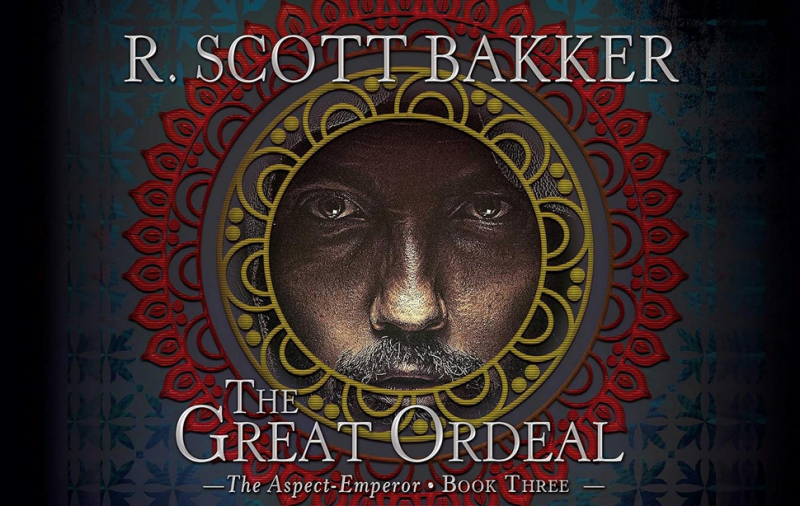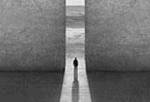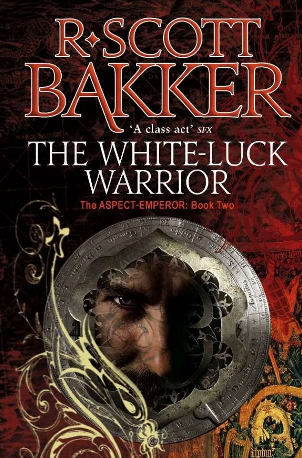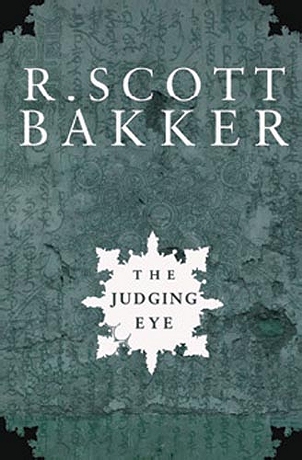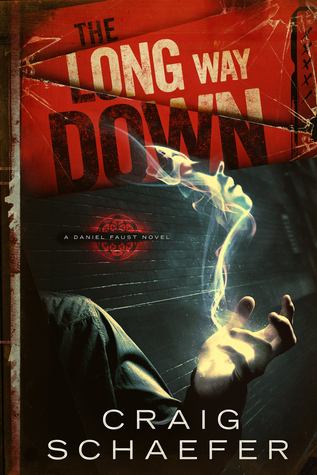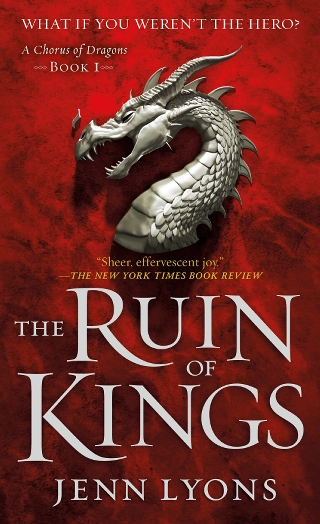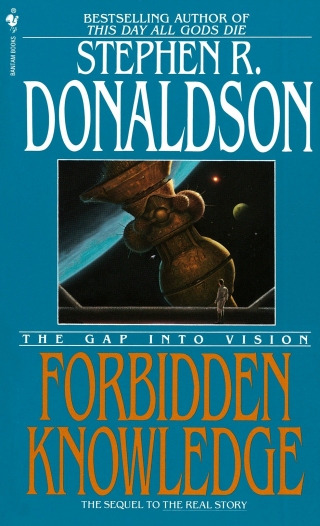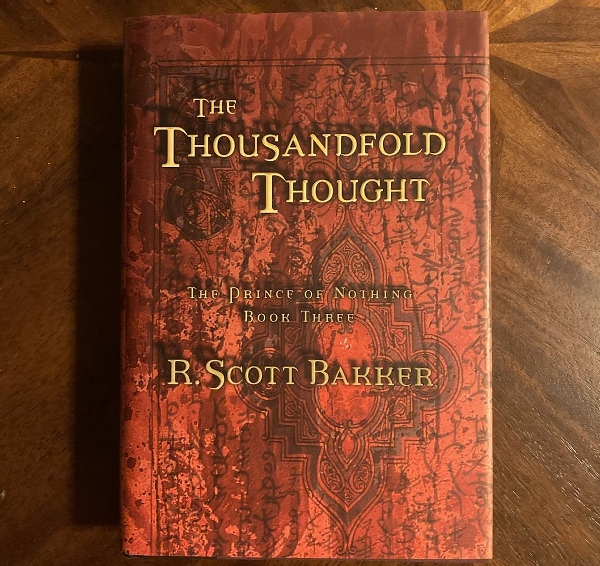
Not a conventional review, if I was ever able to write one.
This final book, and the whole arc of the trilogy is exceptional. Reading it all at once without pauses in between, not as a quick re-read, but as a methodical one where I was fully focused, on every word, every line. Giving it 100% of my attention to every page. I can say that this type of approach helped immensely. It’s not usually the case, as it is often suggested to simply power through, especially with difficult books. That eventually things will make sense. I think here it’s the opposite. The moment you lose even a small thing, you risk missing the world. The more you reign in, the more you collect.
I was curious to see if, with this regular, methodical read on my side, the three books would show some general “changes”. A dip in quality? Some signs of exhaustion? Different pacing, more loose characterization. But honestly there isn’t much that I can meaningfully say. Reading “feels” different, moving from the first, to the second and third. The first book does “feel” the better of the three. Not in writing quality, but because of the ease of plot and themes. I already mentioned that this third book is more frequently than before a fly-by, taking a step away from the closed perspective. But after contemplating the whole thing from the end, I feel that this overall shape was necessary and fitting.
This needs this sort of premise, because I’m going to rant. About what the trilogy ISN’T. But I don’t have even words about what IT IS. Looking back, it truly feels like an impossible journey. The experience of reading these books is unique. And the sheer ambition, and then mastery of the impossible task is inhuman. As a reader, 95% of the hard themes written here were already very familiar to me. I have followed Bakker along the years, and I had similar “worldviews” already before then. He wasn’t going to tell me something new and unprecedented. Yet, I couldn’t do without these books and the read felt transformative. The mental clarity and focus they give me. The sheer ELOQUENCE.
This is in some part what I’ll attempt to write here: past the first book, there isn’t much that is being added. Ironically it refers to the title, the Darkness that comes… before. Mystery and revelation precede, do not follow. And yet, everything that comes after has the sheer power of eloquence, of being experienced. Of seizing the import of what was commanded.
So, to satisfy the simple necessities of a review: this third book is certainly the “weakest” of the three. But not, as I suspected, because of a dip of writing quality (Bakker mentions in the books that the writing of books 2 and 3 was a mad sprint, compared to the elaborate planning that preceded the 1st). I feel like this trilogy acquires a necessary shape, and there’s nothing to match the intellectual war between Cnaiur and Kellhus in the first book. It’s a shape of story that consumes, rather than elevate. And I think this is precisely the point. Those last few pages.
The conclusion itself is perfect, Achamian was MY voice. Rarely I felt so much identity with what was being expressed. That last chapter talked directly to me. Like the “voice”, now addressing Achamian. “TELL ME, ACHAMIAN.” I do think that the world described in these books is the same world we live in. And I’ve reached on my own the same conclusion: that the only way to be in this world, is to refuse to participate. But Achamian is so well written than he’s not just the voice of clarity and a man transformed. He’s still deeply wounded, and he could only end up lashing out at Esmenet. Yet another time. Calling her a whore, lashing at her with the violence of his words to hurt her.
Achamian comes out of the scene as a WIZARD. Bakker even gives him a staff, one step from transforming into Gandalf. And yet Achamian, right here, is a far shot from the wiser calm wizard. He’s still driven by anger. Maybe in this, he is connected with Cnaiur and Kellhus: madness. He finally hears the No-God. The sightless god-head that finally turns to him. Not Seswatha. The whisper from Otside breaks the charm.
The excerpt that precedes this small last chapter has:
“there are many things of which I am absolutely certain, things that feed the hate which drives this very quill.”
I think this last scene, capping the whole trilogy, is perfect in the imperfection of Achamian. In that illegitimate hate against Esmenet, even if in the shadow of the hate for Kellhus. Achamian, still a fucking human being (very much fucking, considering the only thing he could get from Esmenet was fucking one last time).
But.
Reading the last 100 pages has been infuriating, more than it’s been anything else.
I felt frustration when precisely 100 pages from the end, Achamian pulled out his map. How many times this scene was repeated through all three books? Every time it felt like we inched so very close to a moment of revelation. Only for it to slip away, once again. This final time it’s as if there’s crackling electricity in the air, as if the names on the map would start moving on their own, and mold together to form a final design…
The sorcerer rocked back and forth in the candlelight, to and fro, muttering, muttering …
“Back-back … m-must start at beginning …”
He quickly scratched a welter of new lines, all the connections he had ignored since his abduction by the Scarlet Spires. Then, in a hand too steady to be his own—for he was mad, he knew that now—he wrote
he pondered the identity of things, the way words did not discriminate between repetitions. They were immortal, and yet they cared.
He stared at the completed map, insensible to the passage of time.
He had become a ghost that stared and stared, not really pondering but watching, as though the secret lay hidden in the ink’s immobility …
Men. Schools. Cities. Nations.
Prophets. Lovers.
And?
There was no pattern to these breathing things. There was no encompassing thought to give them meaning. Just men and their warring delusions … The world was a corpse.
Xinemus’s lesson.
Nothing. Three books and it all comes to nothing. Delusions. Xinemus hovers like a punishment over the need for meaning.
Even in the light of mysteries solved in the following 100 pages, that map stays pretty much pointless. The revelations about mysteries lingering from the first book, like the figure of Maithanet, lead to dead ends. Solutions that do not lead anywhere meaningful. Mysteries that didn’t truly deserve being withheld for so long.
At the end of this scene I started to feel some cynicism about where the book would ultimately lead. I felt there wasn’t enough “space” left to deliver what I expected and demanded.
75 pages from the end, I decided it was it. In some other review a while ago I read the last 100 pages of the book were like a convoluted discussion of metaphysics. I could only hope it was the truth, because the problem is that there isn’t ENOUGH. The worldly scenes about the battle in Shimeh alternate with the “confrontation” between Kellhus and Moënghus. I didn’t resent this constant interruption and division in small pieces. Everything was fitting. But… there wasn’t enough space left.
I was driven by a hunger for SOMETHING. And despite these pages were tossing little bits of information, it was becoming clear that is was all a giant detour. That there wasn’t that payoff that I was waiting for, and that was, for me, NECESSARY.
So, somewhere around page 75, I closed the book. Because I knew.
I built my own idea, that now I’m laboring to retrieve once again. But it was too complex to simply rebuild here. That’s why I actually hate writing. Because it feels like 10x the effort. I spend effort in the thinking, but then I have to backtrack it all, if I want to write it on the page. A week later, it’s simply an impossible task and even the best attempt pales.
In any case, the central concept was that I saw the trilogy as a sort of domino. Now that I closed the book, that idea still seems to me valid. There isn’t any real point to drive to. There isn’t a final destination, same as Shimeh itself was a sham. It was CLEARLY a sham of course. But the same for the reader. The events that unfold through the series, unfold from the first book. Like water cascading down, taking shape by circumstances, by what it finds on its path. Enacting its own theme, Darkness precedes, the rest follows. If the first book sets the premises, then the evens in book 2 are, as being retold in blindness by both Moënghus and Kellhus: axiomatic. The themes were set, what followed was simply observation. The following books weren’t unnecessary, though. Because even in repetition, it’s the eloquence that has immense power. This last section could be seen as an info-dump, a long recap as Moënghus and Kellhus retell each other movements through inference. But again, it’s power in eloquence. In the power of words that almost become chants.
“You gave them certainty, though all the world is mystery. You gave them flattery, though all the world is indifference. You gave them purpose, though all the world is anarchy.
“You taught them ignorance.
While I was already surrendering hopes of getting the answers I needed, my problem became the answers that came.
Because this, here, is something that sounded hollow. That did not feel coherent, contrasting sharply with the clarity that preceded. There’s so much to unpack in this last book. I wish again I could paste here all my complex thoughts as I was reading. But at least I can get to the point.
There are some things that are suddenly weird. At one point, walking down a corridor, lead by Moënghus in the dark, Kellhus “inadvertently kicks” a skull. This doesn’t return later. Why is this happening? My only interpretation is that it works as foreshadowing. Kellhus was mentioning a conclusion to the Scarlet Spires story. They would all die. But… why? Since when Bakker writes these kind of “scenic” passages? Why this sudden artistic license, when everything is so sharply focused, being driven. There is no real ornaments, outside of the use of language. Instead these last 100 pages seem to be descending into a manipulation. Of things happening for their exhibition. As if the world wasn’t anymore a corpse, but a showman. As if the world wasn’t anymore indifferent to the vagaries of men, but was goading.
This built a disconnect, between me and these pages, that never happened before. Because my surprise was that it wasn’t simply a false perception, but it SEEPED into the story. It became its own theme. Both Moënghus and Kellhus started to sound FALSE. False to each other, meaningfully, but also to the world. They started to act wrongly. To speak wrongly.
How could Kellhus not anticipate the scenes between Esmenet and Achamian. It should have been a child’s play, compared to what he engaged before. How could you shape whole populations, but not understand the two of them.
There is a moment where Kellhus returns himself. He agrees with his father. The world is closed, that’s why he could do the things he had done. Maybe his further doubt is fine. He decides that what happens is beyond mere consequence. My own problem is that while all this comes better in focus, it just isn’t working well. The more things move toward the metaphysical, the more I feel like disagreeing.
I embrace the fact that the world is closed. Here Bakker uses language that is very familiar to me. When Kellhus first is introduced to the concept of magic, he assumes it’s a trick. Another occluded experience that is waiting to be fully exposed. His doubt holds on, because the beginning of his own mission starts with visions, sent my Moënghus. This is already part of the mystery. Not the reason WHY Moënghus summoned him. But HOW. How could Moënghus send visions? What’s the magic of this world truly based on? What’s the gimmick? Is it here to say what?
There are concepts that return often, and that are quite clear. If the world is closed, deterministic, there’s no free will. I feel it’s perfectly fitting that Moënghus seems to blend and merge with the world as he speaks. The voice from nowhere. Impersonal. Godlike. The moment the world is revealed for what it is (closed) then points of view disappear. The Shortest Path is, again, axiomatic. Given the full context and all variables, there’s only one path, the shortest path, connecting A to B (or equally short, but lets not bog down this point). If there’s one optimal, absolute path, then what space is left for personal choice? That’s why I find funny that with Moënghus and Kellhus inferring each other… they become predictable. Because they obviously lose their free will. They also become slaves to their circumstances, not masters. Whether or not they SHAPE circumstances, they shape them in that one precise path that is suitable. That one precise path that no one chose. It was simply there to be taken. Because by seeing everything, they betray their own boundary. They get the world, but they lose themselves.
And yet, what’s there to shatter this system? That the world is not closed.
Here Moënghus simply rambles on. I do not follow.
“The Dûnyain,” Moënghus continued, “think the world closed, that the mundane is all there is, and in this they are most certainly wrong. This world is open, and our souls stand astride its bounds. But what lies Outside, Kellhus, is no more than a fractured and distorted reflection of what lies within. I have searched, for nearly the length of your entire life, and I have found nothing that contradicts the Principle.
Wh-what?!
What the fuck happened to being Dûnyain? How can you say “nothing contradicts the Principle” when by stating that the world is MOST CERTAINLY OPEN, you already, immediately contradicted the very premises that creates the condition for that principle to exist?
What happened to the SCIENCE of knowledge?
You’ve just accused Kellhus of claiming certainty without proof, calling him mad. And now you make mad claims without a foundation. How can you accept those conclusion when they DO NOT FOLLOW?! What happened to what came before?
Science is an amalgam of theories SHAPED so they can be TESTED. They are built specifically TO MAKE THEM VULNERABLE. To collapse possibilities. Because to test truth you shape a thesis to shatter against it. This is what a proof is. It’s a test precisely thought for the specifics that can break the thesis.
Focus moves from ontology, the “what”, the truth of things. To Epistemology, how human beings decide what is true. Not WHAT is true, but HOW we decide. Because, “it is axiomatic”. If we can agree on “how”, the process we look for truth, then WHAT is true is not important. Because we will always agree, no matter what. Once we agree on the process, the conclusion will always be the same. Predictable same as a Dûnyain inference.
We often confuse things on this level. Some believe that science is a way to knowledge. Truth is, there’s nothing else. As human beings, we don’t get to choose. The truth about science, and knowledge, is that there isn’t an alternate path. Not because science is valid, but simply because a contender, in the history of humanity, NEVER SHOWED UP. You can doubt science, of course. You can map its limits. But NOTHING changes the fact that there is nothing else. That there is no alternative.
There is nothing, along the whole history of humanity, that has defied, even for a tiny, minuscule moment in time and space, the rule of physics as we know them. I’m not saying, of course, that everything is explained. The opposite: I’m saying there isn’t one, even minuscule thing that PROVES otherwise. That explicitly contradicts. While we have proofs of science and knowledge working, every single moment of our life, we have not a single instance of the opposite. The opponent never showed up. Not once in recalled history.
Once we know what science is, understanding metaphysics is not trickier, even if most people are biased against it. The point is, there is no difference between science and metaphysics, in the sense that they follow the exact same rules when it comes to epistemology. So when it comes to the ROOTS that make the process for knowledge valid, and those conclusions possible. The dividing like is not conceptual, it’s not abstract. It’s merely pragmatic: science is a process to test thesis. It’s the breaking point. But all that comes before and after, the production of a thesis, the analysis of its outcome, are what is preserved when it comes to metaphysics. Things still have to make sense, and analysis can sometime reveal contradictions. Weaknesses in the thesis.
If the line of distinction is that science can test, then what defines metaphysics is the complete surrender of even the possibility of certainty. It doesn’t mean there’s nothing, but it means that so much more of it than even in science, skepticism will reign. Not only that you don’t know, but you won’t likely know, ever.
Which is kind of funny, because the very essence of Dûnyain, of THE LOGOS, is not using tools of science. Have you ever seen a Dûnyain TEST something? Nope. The Probability Trance maps the worlds ahead, shaping them after variables change. It’s purely mental. Meaning that: IT’S PURELY METAPHYSICAL.
And metaphysics, exactly the same in our world, only works when THERE ARE NO GAPS. Only when the world is closed.
I’m upset here not just at the claim that the world is OPEN. Kellhus could have said that, because the line of distinction, between Moënghus’s Logos and Kellhus’ Thousandfold Thought, is the OUTSIDE. The PRESUMPTION that the world is open. This is the pivotal point. And yet, it’s instead Moënghus claiming, with almost certainty, that the world… is open. And it’s again himself saying… IT DOESN’T MATTER. Because the Logos is untouched. There are all sort of contradictions here. Why doesn’t it matter?! And more importantly, if the LOGOS is your practice, how could you come to the conclusion the world’s open? It’s a huge gaping hole in the Logos itself. In the PROCESS of establishing what’s true. But most irritatingly, it’s not Kellhus’ error here, which would be justified, but Moënghus. They flip sides without even realizing it.
While reading these pages I was shaking my head, because… how could you title a book THE THOUSANDFOLD THOUGHT, and not give an explanation to what it is. We’ve come to the end of a trilogy, and even the title is mockery. So I started to feel like I wasn’t going to get answers, but even more irritating was the idea that answers were actually given in a way that made them incoherent.
What is the point of distinction between everything we’ve known up to this point about the Logos. The Shortest Path and Probability Trance are already a synonyms, but at least one indicates a purpose. We know the Probability Trance, that is just a process to employ the Logos. So what is the Thousandfold Thought, more? What makes it more? What sets it apart from what they both (Moënghus, Kellhus) were already doing? Why isn’t there an explanation about this? “Kellhus had seen it many times, wandering the labyrinth of possibilities that was the Thousandfold Thought”, how’s this any different from the Probability Trance? Kellhus begins in the first book wandering through possible futures, then toward the end of book 2… grasps the Thousandfold Thought, which is the exact same thing, but under a different name.
Again, everything that is happening in this scene is a retelling, with incredible eloquence, of what happened. Plus the suggestion of what comes after: Kellhus not only has retraced his father’s footsteps, but moved beyond. He feels that his grasp of the Logos and circumstances have made his father obsolete. But if this is the point, then the one who could claim of being more, is Kellhus. The Thousandfold Thought is his. The line of distinction would be: the breach of metaphysics. The Outside that bleeds in. His own powers with gnostic magic. The breaking of the Logos, seen by Moënghus as “madness”. The voices, the miracles. What just couldn’t be grasped through the metaphysics of the Logos, because… the world’s open.
I just can’t make sense of any of this. Kellhus “acquires” the Thousandfold Thought in book 2. Before the voices, before the circumfixion. So before the specific events that would make him “mad”. Both Kellhus and Moënghus claim of wielding the Thousandfold Thought, even if again there’s nothing indicating it being anything but a repetition of the Shortest Path and Probability Trance.
Because of his conditioning, Kellhus doesn’t deny the claim about his madness. He actually honestly considers it. He understands that this further segment he’s added to his father’s Thousandfold Thought does not follow. He acknowledges his father’s right. But yet he’s driven by certainty. And he acts (“beliefs beget action”). Even if this contradicts everything, creating a mirror with Achamian final section, where he says something quite similar and being driven by anger and certainty.
He was right. Prophecy could not be. If the ends of things governed their beginnings, if what came after determined what came before, then how could he have mastered the souls of so many? And how could the Thousandfold Thought come to rule the Three Seas? The Principle of Before and After simply had to be true, if its presumption could so empower …
His father had to be right.
So what was this certainty, this immovable conviction, that he was wrong?
My problem with these last 100 pages is that there wasn’t enough metaphysics, feeling solid. The Thousandfold Thought is either a sham, or repetition of the same concepts already introduced in book 1. It all converges to the end, but it isn’t MORE. It doesn’t reveal more. Maithanet, Moënghus and Kellhus don’t become more. Maithanet is played down and dismissed. Moënghus is utterly powerless in the realization he’s been superseded. Kellhus is going through a power trip that isn’t making him more, it’s making him the contradiction of everything he was, without a consistent and meaningful cause. The actual exception to the Logos.
I isolate these three aspects: Achamian’s map, “WHAT DO YOU SEE?”, and the Thousandfold Thought. Bakker built these as if they are rhythmical beats that repeat throughout all the three books. As if they were a march, leading toward some final ascension and revelation. I needed all three to deliver something, to be something more. Every time one of these scenes repeated, it felt like revelation was imminent. That something was about to be said would put things at least in a different light. And yet it slipped away, every single time. It felt as if something was added, but it was illusory. Then, 25 pages from the end,
“Tell me, Father … what is the No-God?”
And we get nothing. Tell me, R. Scott Bakker, why do you keep goading, and surrender nothing. We are at the end, there are no pages left.
“The skin-spies—what have they told you? What is the No-God?”
Though walled in by the flesh of his face, Moënghus seemed to scrutinize him. “They do not know. But then, none in this world know what they worship.”
Then WHY?
It all comes to this central pillar, like a maelstrom that is the pivot of the whole story. And it’s simply missing. There is no motive. None of this, about the ultimate purpose of the Consult and the Inchoroi, is revealed here. There is, slightly past the middle point of a book, a scene where Kellhus face a possessed Esmenet. This scene already revealed more, but again failing to give a solid motive that would justify the rest. It even mirrors the same structure “Tell me, what are the Dûnyain?” and “So what are you, then?” Kellhus asked. “What are the Inchoroi?”
“A race of lovers.” Okay, doesn’t mean anything. “And for this you are damned.” This means even LESS.
“We were born for damnation’s sake.” How’s this a valid MOTIVE. This is a pure evasion. Missing entirely the point.
“Our very nature is transgression.” Transgression of WHAT? If you are part of the natural order, then what are you transgressing if not an arbitrary rule? What is the point of this dividing line? How there can even be a morality, in a system where the concept of sin holds no ground. Who’s even making the rules? The gods? Why aren’t they then RESPONSIBLE for the contradictions they BREED?
Who’s the judging eye? What the hell is “damnation” in a world like this? Why at the very end Kellhus accuses Moënghus, when he has already done the same or worse?
“The crimes you’ve committed, Father … the sins … When you learn of the damnation that awaits you, when you come to believe, you will be no different from the Inchoroi.
“For this I am to heave and scream in lakes of fire?” They are scared of literal hell?! How, when this world already is hell?
“There is no absolution for your kind.” Oh, the merciful god. Where again is the line of distinction? That men are slightly less perverted, slightly more coward?
“To save my soul, hmmm? So long as there are Men, there are crimes. So long as there are crimes, I am damned.” Somehow, the presence of men produces crimes. Not as acts of men, but as the realization of morals. Nothing about this makes any sense. Men create the gods, then placed them on the Outside. Now the Inchoroi resent men, because they have pinned alien metaphysics to their own landscape. What an annoyance. Curious that they were flying through the cosmos in their golden spaceship and happened to crash specifically on that bit of dry land where they happen to be damned.
The scene at the end doesn’t add anything else, beside Kellhus’ realization that a Thousandfold Thought lead by Moënghus would only end with him joining the Consult. And once again, that gaping hole within the maelstrom: why?
The whole thing misses a motive. We see these projected futures, but absolutely nothing about the inferences that lead them, that make them axiomatic. The duel of intellect between Cnaiur and Kellhus, in the first book, was so enthralling because Kellhus was a man. His powers were simply a somewhat plausible extension. They weren’t magical or absurd. But throughout this third book the points of view have been closely guarded, to carefully avoid explanation. To evade. This goads and builds mystery, but then is utterly disappointing when nothing follows.
What about the recurring flashback in this third book. Seswatha and Nau-Cayûti, sifting through the labyrinth of the golden spaceship, looking for a … laser rifle. Following through the whole book. And leading up to what? The revelation, already known from the beginning, that Seswatha tricked the boy. Again, there is nothing MORE. These scenes seem to be just there. They give some insight, but it’s not as meaningful as these scenes FEEL. It always seems as if there’s something missing. They don’t even find the laser rifle at the end. In the final scene they only end up discovering that the Inchoroi have been naughty. And Nau-Cayûti blaming Seswatha for his own stupidity (again, if you really cared, then ask why and how, not what. It seems that Nau-Cayûti simply nursed that lie rather than confront it).
When I first read the “WHAT DO YOU SEE?” scene, in the first book, I was confused. This is being described as the ultimate evil, Sauron turned into a floating iron closet. But… I don’t know. Some of it feels like a parody. And the words themselves. The vagueness. The bold font. They have power instead. The words themselves are used meaningfully through all three books. But within these scenes the No-God seems to be powerless rather than a force of evil.
The little pieces that are added, repetition after repetition, amount to: “I CANNOT SEE SHIT!”, paraphrasing. “Help me! I cannot see!”, the No-God seems to say.
It turns into a voice of desperation. Not force of will. But being all so vague, I don’t really know. There are a couple of places through the books where this idea is directly contradicted. But who knows what comes from the No-God and what is instead simply projected on it. This floating carapace seems built like a trap of misdirection. And yeah… What about the final scene. Once again, with Achamian. A different scene. What if Seswatha’s memories are a lie? Was that the purpose of Nau-Cayûti’s story? The proof that Seswatha would bend the truth and manipulate, if necessary?
“What am I?” the dark and regal face said, frowning. His oiled braids thrashed like snakes about his shoulders. The last of the light glimmered across the lions wrought into his bronze armor.
I already said that Bakker’s writing for these last 100 pages has been oddly evocative. Incongruous because of that. Where the world bends to the vagaries of men. Here’s a similar case, in my own interpretation.
“His oiled braids thrashed like snakes about his shoulders”, I see this part as a reference to the Cishaurim’s snakes, wrapped around the necks. “The last of the light glimmered.” For me the purpose of these words is to evoke blindness. The same blindness of the Cishaurim.
“The painted eyes fixed him, honest and intent.” The No-God, honest and intent.
“As though demanding a boon.” As if the god is waiting… for approval?
I MUST KNOW WHAT YOU SEE.
But I don’t see anything. It’s as if this No-God is asking to be MADE. To be realized. He seems the very opposite of an act of will. He seems lost, blind, waiting for someone to direct him. Tell him where he is and what’s happening. He’s like trapped within the carapace, asking if there’s someone, something outside that can help. Is there even a world? He becomes a voice with no place. A voice with no self. But then, a voice that suffers for sins not committed. “Closeted”, guarded, used.
It is surprising that no one ever answers.
At the end of this specific scene the voice calls explicitly for Achamian. I think the intent shifts here and the purpose is to create a link between Cnaiur and Achamian, and then to Kellhus: madness. All three can hear the No-God. And all three step outside of circumstances because this madness supposedly makes them breach to the Outside. Again, I liked better in the first book, where Cnaiur’s madness wasn’t otherworldly. It simply allowed him to surprise Kellhus, merely because Kellhus could only use the Logos with the information he had. The whole point for keeping alive and using Caiur was that he needed him and his knowledge. Information had to be acquired, and madness was simply a certain temporary darkness. Darkness that stayed this side of the world. And yet, madness at the conclusion of the trilogy becomes a super power that bridges worlds. That whispers like bicameral mentality. That magically connects with that “certain” Outside. It doesn’t feel earned to me. It is not meaningful. It is not insightful. It’s just magical hand waving, and it’s all about this central point that is metaphysically hollow. Basically a McGuffin.
Kellhus walking underground through non-men corridors, described in detail. Always goading onward. I don’t resent reading this, but why? Walking to get to his father, then following his father. Leading to nothing. What’s about that place? What’s about all the water? It builds and builds. Could have just found his father napping under a tree, a passing mention about the skin-spies.
I’d have as many other things still to say, but I’ve had enough here.
I will repeat that all this frustration I voiced doesn’t make the read through these three books less extraordinary. I’ve expressed extensively what the books aren’t, but what the books are still remains. The greater part. It defies me. This is the only thing I’ve ever read, even compared to Tolkien, Erikson or Martin, that I do not think possible. I do not understand how it came to be. If you ask me what would it take to build a thing like this from scratch? My answer: too much.
If I look back at the journey of the men of the Tusk, from the very beginning, I can only think: it’s too much.
Ironically, because what else could the Inchoroi hope for, if not this mad butchery of human life. I imagine them, flapping about and crying “OH YES! THEY ARE DOING IT THEMSELVES!”
About the things missing from the books. Those that I expected but weren’t delivered. I know there are three (four) more books, but this is not the case. I feel that if something was going to be added, and merely moved to the second trilogy, then Bakker would have still written this third book differently. I’m quite sure, knowing the way Bakker writes, that the third trilogy won’t bring more to the table, in the sense I intend. I’m not delusional about what to expect. If those kind of answers were going to be delivered in the way I expected them, then they would have come already. I’m sure of this, but we’ll see.
In any case, this doesn’t make books 2 and 3 superfluous. The journey has to be taken. What is there on the page, is not diminished in any way. I just have my lusts for knowledge…
And I was forgetting one important point. That excerpt that introduces chapter 17, just eight pages from the end, encapsulates with eerie precision my own personal stance toward life and the truth of the world.
Ajencis, in the end, argued that ignorance was the only absolute.
According to Parcis, he would tell his students that he knew only
that he knew more than when he was an infant. This comparative
assertion was the only nail, he would say, to which one could tie
the carpenter-string of knowledge. This has come down to us as the
famed “Ajencian Nail,” and it is the only thing that prevented the
Great Kyranean from falling into the tail-chasing scepticism of
Nirsolfa, or the embarrassing dogmatism of well-nigh every philosopher
and theologian who ever dared scratch ink across parchment.
But it doesn’t stop there. Of course Bakker contradicts it. So when I was reading it I stopped, and decided to continue reading those last 8 pages, to then return to the last part of the excerpt after the end. As if Bakker threw me a final challenge and I’d answer it. Return to see if he would open a crack in the only thing that drives me.
I disagree.
But even this metaphor, “nail,” is faulty, a result of what happens
when we confuse our notation with what is noted. Like the numeral
“zero” used by the Nilnameshi mathematicians to work such
wonders, ignorance is the occluded frame of all discourse, the unseen
circumference of our every contention. Men are forever looking for
the one point, the singular fulcrum they can use to dislodge all
competing claims. Ignorance does not give us this. What it provides,
rather, is the possibility of comparison, the assurance that not all
claims are equal. And this, Ajencis would argue, is all that we need.
This is not an argument, this is a straw man. Then the following becomes more conciliatory…
For so long as we admit our ignorance, we can hope to improve our
claims, and so long as we can improve our claims, we can aspire to
the Truth, even if only in rank approximation.
But I disagree. When it comes to the concept of truth, it’s all about time. Life is fleeting. We are no Dûnyain because, among other things, we have not enough time to think. You can hope to improve your knowledge as long you justify your life by taking your future for granted. But this is another delusion. It’s just moving that nail of morality ever onward. No one is ever judged, because there’s always hope. Hope to understand more and become better.
Judgement about truth, the “Ajencian Nail”, is about the now. What you know, now. What you decide, now. It doesn’t matter what you will know. It doesn’t matter if life will give you another chance, same as it doesn’t matter if you don’t have one. That abstract nail is simply experience. And experience is absolute in the sense that it cannot be denied, it cannot be contradicted. You know it now, and it will be true for the eternity. No one can rob you of your immediate present. People misunderstand things like hallucinations, because they seem proof that perception, too, is deceiving. But this is a false interpretation. No one denies the appearance of hallucination. Only its interpretation can be “false”. You can move and reframe, you can complete by adding more, but you can’t change what is contained.
Our three-dimensional world seems to overwrite our perception every instant. A sequence of frames one after the other like a movie. But there isn’t any contradiction in this world. What appears as overlapping, what appears crossing impossible boundaries, A transforming into B, becoming something other than itself… is merely adjacent. Perception, as information, is forever adjacent. With gaps, of course, because it’s all severely limited, by information collected and ability, possibility for the brain to process. But it’s never contradicting. And yet forever incomplete.
The world is closed. To our experience and memory, it’s never been open. The world is closed. And this piece of the world you hold in your hands, is YOURS. For eternity.
…And the Apocalypse is nearing. But thankfully then, I don’t have years or months, or even days to wait before the next book. Onward I proceed.
(what follows here is a collection of quotes, some already used above, that for some reason I decided to rearrange in what’s essentially an inverse order)
Ajencis, in the end, argued that ignorance was the only absolute. According to Parcis, he would tell his students that he knew only that he knew more than when he was an infant. This comparative assertion was the only nail, he would say, to which one could tie the carpenter-string of knowledge. This has come down to us as the famed “Ajencian Nail,” and it is the only thing that prevented the Great Kyranean from falling into the tail-chasing scepticism of Nirsolfa, or the embarrassing dogmatism of well-nigh every philosopher and theologian who ever dared scratch ink across parchment.
“Set aside your conviction,” Moënghus said, “for the feeling of certainty is no more a marker of truth than the feeling of will is a marker of freedom. Deceived men always think themselves certain, just as they always think themselves free. This is simply what it means to be deceived.”
“Men cannot see this because of their native incapacities. They attend only to what confirms their fears and their desires, and what contradicts they either dismiss or overlook. They are bent upon affirmation. The priests crow over this or that incident, while they pass over all others in silence. I have watched, my son, for years I have counted, and the world shows no favour. It is perfectly indifferent to the tantrums of men.
“And the Truth?” Kellhus asked. “What of that?”
“There is no Truth for the worldborn. They feed and they couple, cozening their hearts with false flatteries, easing their intellects with pathetic simplifications. The Logos, for them, is a tool of their lust, nothing more … They excuse themselves and heap blame upon others. They glorify their people over other peoples, their nation over other nations. They focus their fears on the innocent. And when they hear words such as these, they recognize them—but as defects belonging to others. They are children who have learned to disguise their tantrums from their wives and their fellows, and from themselves most of all …
Lies that have conquered and reproduced over the centuries. Delusional world views that have divided the world between them. They are twin viramsata that even now war through shouts and limbs of men. Two great thoughtless beasts that take the souls of Men as their ground.”
“The path was narrow, to be certain, but it was very clear. You cultivated their awe and their inklings, telling them things no man could know. You appealed to the spark of Logos within them. You mapped the logic of their commitments, showed them the implications of the tenets they already held. You showed them beliefs fixed by truth rather than function. You made their fears and weaknesses plain—you showed them who they were—even as you exploited those weaknesses to your advantage.
“You gave them certainty, though all the world is mystery. You gave them flattery, though all the world is indifference. You gave them purpose, though all the world is anarchy.
“You taught them ignorance.
“And throughout, you insisted that you were only a man like any other. You even feigned anger when others dared voice their suspicions. You did not impose, and you never presumed. You conditioned. You gave one man a wheel, another an axle, another a harness or a box, knowing that sooner or later they themselves would put the pieces together—that the revelation would be theirs. You bound them with inferences, knowing that someday they would make you their conclusion.”
“There were no codes. There was no honour. The world between men was as trackless as the Steppe – as the desert! There were no men… Only beasts, clawing, craving, mewling, braying. Gnawing at the world with their hungers. All these thousands, Men of the Tusk, killed and died in the name of delusions. Save hunger, nothing commanded the world.”
“All things both sacred and vile speak to the hearts of Men, and they are bewildered. Holding out their hands to darkness, THEY NAME IT LIGHT.”
